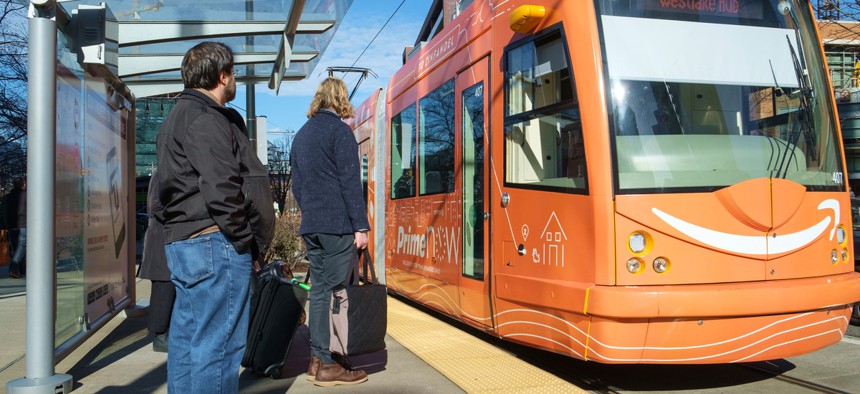Seattle Mayor Pulls Brake on Streetcar Expansion Project

The South Lake Union streetcar line in Seattle, seen here, would be connected to the First Hill streetcar line with the proposed Center City Connector. Shutterstock
Advocates of the Center City Connector fear that if the project is scuttled, federal funding for other local transportation priorities could end up in jeopardy.
SEATTLE — Mayor Jenny Durkan’s administration announced Friday that nearly all of the work on the city’s next streetcar project would be halted pending a new independent review of costs, which the mayor’s office says are turning out to be higher than was originally projected, as a preliminary assessment indicates.
“The City of Seattle has a critical obligation to spend taxpayer dollars wisely and an equal obligation to transparency,” Durkan, a Democrat and former federal prosecutor who took office after a special election last fall, said in a statement. “There are too many questions about the true costs of this project and the risks to taxpayers, which is why we must put the brakes on this project. As your new Mayor, I will continue to scrub our budgets and act to protect taxpayers.”
Most of what is at issue is a disagreement between the Seattle Department of Transportation and King County Metro, the transit agency that’s contracted to operate Seattle’s two existing streetcar lines, over the number of employees that will be needed to operate the expanded system.
The difference raises the cost estimate for the Center City Connector, as the streetcar project is called, to upwards of $200 million.
As The Seattle Times reported last month, Metro officials said that SDOT had previously “ignored Metro’s estimated labor cost for streetcar [operations and maintenance] by $8 million” when it was applying for federal grants and being considered by the Seattle City Council.
About $75 million in federal funding is covering a big share of the construction costs of the CCC, which would run mostly in its own right of way through Seattle’s downtown core on First Avenue and connect the current South Lake Union and First Hill streetcar lines, including stops in Pioneer Square and near Pike Place Market.

The streetcar projects in Seattle are separate from the current expansion of the Sound Transit Link light-rail system currently underway in North Seattle and over Lake Washington to Seattle’s Eastside suburbs. (Sound Transit did foot much of the bill for the First Hill streetcar as a consolation for canceling a proposed light-rail subway station in the dense neighborhood due to poor soil conditions.)
Transit advocates fear the pause in the Center City Connector—utility relocation has been getting underway in the Pioneer Square area on First Avenue—is just a precursor to killing the project outright. There are additional worries that scuttling the extension just as construction was getting started may leave a bitter taste in the mouth of the Federal Transit Administration, which gave the streetcar expansion project a high project rating when it was competing for funding, which Washington state’s congressional delegation, including Sen. Patty Murray, fought hard to secure in the nation’s capital.
As The Urbanist observed on Friday:
That forfeiture, if it happens, could jeopardize Seattle’s place in line and standing on other transit projects seeking federal grants, including Sound Transit light rail projects, as Councilmember Rob Johnson has pointed out. It’s not clear how much money could be recovered from contracts canceled this late in the process.
It could also impact other federal investments Seattle is seeking in bus-system improvements, including the expansion of the highly successful RapidRide bus rapid transit network, which includes frequent service, off-board payment, all-door boarding and routes that feature transit-priority lanes to speed trips through congested areas.
“If this affects FTA awards for other transit projects like Madison BRT, as streetcar boosters warn, then it will be one of the more disastrous decisions in Seattle’s transportation history,” Seattle Transit Blog wrote this weekend.
Durkan has been belt-tightening push across Seattle’s municipal government, and last month called for department budget cuts that could potentially be as high as 5 percent and says the city needs to be more fiscally responsible.
“Part of the problem is that we've put in place new programs with one-time money. Instead of having a dedicated revenue source for all the programs that we're doing, we have short-term revenue sources,” Durkan said in an interview last month with KUOW.
Seattle has had mixed results with its local streetcar investments. The First Hill streetcar line has been criticized as slow and taking an awkward route—which is necessary to ascend an otherwise steep grade—through mixed traffic. Seattle transportation officials have been assessing various potential spot improvements to speed up streetcar service there, as Toronto transportation officials have done with the Canadian city’s King Street pilot project. Improvements made along Westlake Avenue in Seattle for the South Lake Union streetcar line, including transit-priority lanes, has boosted local and RapidRide bus service through the increasingly dense corridor, home to much of Amazon’s massive Seattle employment.
What comes after the new independent review for Seattle’s streetcar investments? Time will tell. But one thing is for sure: This current construction timeline is likely to change, perhaps dramatically.

Michael Grass is Executive Editor of Government Executive’s Route Fifty and is based in Seattle.
NEXT STORY: Foxconn in Choppy Waters Over Plan to Drain the Great Lakes






